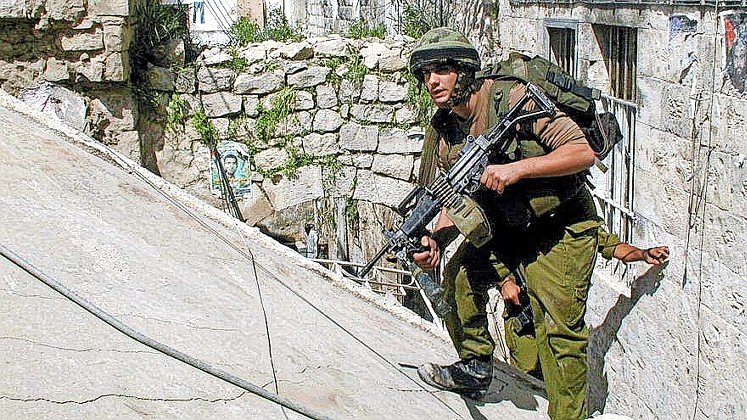‘The History Matters Here’: Returning to Jenin
BBC Jerusalem correspondent Tom Bateman noted that “the history matters here,” in a report on the Israel Defense Forces operation in the West Bank city of Jenin last Thursday that resulted in the deaths of nine Palestinians — eight of them men affiliated with terror groups, one of them a woman civilian.
In the annals of anti-Zionist demonization of the State of Israel, Jenin occupies a special place. The city was the location, in April 2002, of one of the most treacherous myths about Israel’s military conduct that spilled over into open antisemitism.
As Bateman summarized it, “[B]ack then, Israel launched a full-scale incursion — known as the Battle of Jenin—in which at least 52 Palestinian militants and civilians and 23 Israeli soldiers were killed. It had followed a campaign of Palestinian suicide bombings in Israel, many of which involved perpetrators from the city.”
That wording is technically correct and marks a vast improvement of the BBC’s original 2002 reporting of the “Battle of Jenin,” which the broadcaster described as a “massacre” perpetrated by the Israelis.
The reality is that the IDF suffered heavy losses as it battled Palestinian gunmen precisely because it was unwilling, out of concern for the city’s civilians, to take more drastic measures like aerial bombardment to pacify Jenin — the sorts of measures that Russia, Iran or China would take without blinking an eye. But within 24 hours of the alleged massacre, the late Sa’eb Erakat, the Palestinian Authority’s principal negotiator with Israel, was fabricating lurid stories about the IDF’s operation. “They want to hide their crimes, the bodies of the little children and women,” Erakat told the Guardian without a shred of evidence to support this monstrous claim.
Other Palestinians in positions of authority told similar lies. The director of the main hospital in Jenin alleged that the Israelis had deliberately destroyed its west wing — a wing that never existed — as well as its water and power supplies.
“IDF soldiers took care not to enter its grounds even though we knew that it was serving as a refuge for several wanted fugitives,” a former IDF officer, David Zangen, wrote over one year later in November 2003. “We guarded the water, electricity and oxygen supplies to the hospital all throughout the fighting and assisted in setting up an emergency generator after the city’s electrical system was damaged.”
Nevertheless, the myth of a massacre persisted, not just in the Arab media, but in Western outlets too. The massacre that wasn’t became a new blood libel for the 21st century, one that took painstaking efforts by Jewish groups to counter effectively. In the process, Jewish communities were confronted with a form of antisemitism that took spurious assertions as uncontested facts, rooted in turn in an antisemitic mindset that encouraged the worst beliefs about Jews.
No serious analyst of the Middle East these days persists with describing the 2002 fighting in Jenin as a massacre. But Israel has never received a formal apology from those news organizations and international institutions that full-throatedly endorsed the line about massacre, among them the UN, which hastily set up a commission of inquiry in the days after the fighting and then disbanded it once it realized that the massacre claim was unsustainable.
Sadly, the lessons of that sordid episode more than 20 years ago do not appear to have been learned. Not surprisingly, the most glaring offender is the Palestinian Authority, which described last Thursday’s fighting as a “massacre” while accusing the international community of behaving like bystanders.
“This is what encourages the occupation government to commit massacres against our people in full view of the world,” Nabil Abu Rudeineh, a spokesman for PA President Mahmoud Abbas, said afterwards. The PA also announced that it was suspending security cooperation with Israel — a measure it has taken in the past during its fits of pique.
However, as in 2002, the sympathetic chorus of international concern is bolstering the PA’s outlandish allegations. “I am deeply alarmed and saddened by the continuing cycle of violence in the occupied West Bank,” said Tor Wennesland, the UN’s Special Coordinator for the Middle East. Arab and Islamic states also voiced their condemnation of Israel, including those states with diplomatic relations with Israel, among them Turkey and Egypt, and those, like Saudi Arabia, who are rumored to be amenable to a final peace deal with the Jewish state.
The stakes are getting higher once again. For the last few years, the Palestinians have smarted at the loss of their status as the world’s “most important unresolved problem,” as the international focus has shifted to Iranian and Islamist terror group activities in the region as well as more pressing issues like Russia’s ongoing aggression against Ukraine.
Not even an ugly little war in Gaza in May 2021, accompanied by antisemitic violence around the world, was able to engender a new, overarching effort to pressure Israel to make concessions to a foe that refuses to recognize its legitimacy.
Make no mistake — the Palestinians will try again, and they now have an opportunity.
Last Thursday’s death toll was the most extreme since the UN began maintaining records in 2005, a fact the PA and its acolytes will exploit to the hilt.
The Iranians, too, are eager to push the narrative of Palestinian suffering, so as to distract attention from the continued repression of the anti-regime protests that have rocked the ruling mullahs, along with their military alliance with Russian President Vladimir Putin.
And because in western circles, the Palestinian cause is seen more as a humanitarian imperative, and much less as an insidious political campaign to strip away Israel’s sovereignty, it isn’t guaranteed that western governments will offer the uncomplicated defense of Israel that it deserves. Thus, will the myths continue.







